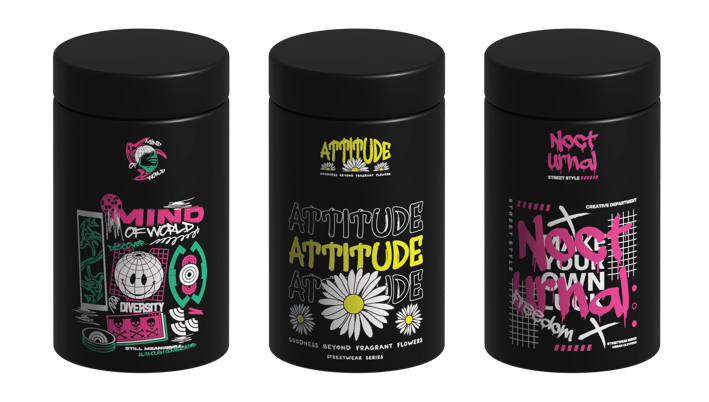The Importance of UV-Protected Glass Containers for THCA Storage


Understanding THCA and Its Sensitivity to Light
Tetrahydrocannabinolic Acid (THCA) is a non-psychoactive cannabinoid found in raw cannabis. It is the precursor to Tetrahydrocannabinol (THC), which is well-known for its psychoactive properties. THCA itself is revered for its potential therapeutic benefits, including anti-inflammatory, neuroprotective, and anti-nausea effects. However, the effectiveness of THCA can be compromised if it is subjected to certain environmental conditions, particularly light exposure.
The chemical structure of THCA makes it inherently unstable when exposed to ultraviolet (UV) light. When cannabis containing THCA is illuminated by UV rays, it undergoes a photochemical reaction that leads to its conversion into THC. This degradation process not only diminishes the potency of THCA but also alters its therapeutic properties. As a result, the preservation of THCA's beneficial effects relies heavily on appropriate storage conditions that mitigate any potential light interaction.
In practical terms, this means that cannabis consumers and producers need to be particularly vigilant with their storage methods. Standard glass containers do not provide adequate protection against UV light, leaving THCA susceptible to degradation. Consequently, utilizing UV-protected glass containers becomes vital for anyone looking to maintain the integrity of THCA over time. These specialized containers shield the contents from harmful UV rays while still allowing for visibility of the product when necessary.
For optimal storage, it is recommended that THCA-rich cannabis products be kept in a cool, dark place, away from direct sunlight and other sources of UV light. This careful approach to storage not only enhances the stability of THCA but also ensures that users can fully benefit from its therapeutic potentials. Thus, understanding the sensitivity of THCA to light is crucial in adopting effective storage practices that preserve its benefits for longer periods.
Features of UV-Protected Glass Containers
UV-protected glass containers are specifically designed to offer enhanced storage solutions for sensitive substances such as THCA. One of the primary features of these containers is their construction from high-quality borosilicate glass or soda-lime glass, both of which provide excellent durability and resistance to thermal shock. This makes them suitable for environments where temperature fluctuations may occur, ensuring that the contents remain stable.
Crucially, the UV-blocking properties of these glass containers are a standout feature. They incorporate specialized coatings or additives that effectively filter out harmful ultraviolet radiation. This is essential for preserving the integrity of THCA, as UV light can degrade cannabinoids and terpenes, leading to a loss of potency and flavor. The protective barrier created by UV-blocking glass helps mitigate these effects, thereby extending the shelf life of the stored substance.
Another significant advantage of glass over alternative materials, such as plastic or metal, lies in its non-porous surface. Unlike plastic, which can leach chemicals or impart flavors to its contents over time, glass remains inert, ensuring that the aroma and flavor profile of THCA are maintained without interference. Furthermore, glass is easier to clean and sterilize, significantly reducing the risk of contamination during storage.
In addition to preserving quality, the aesthetic appeal of UV-protected glass containers cannot be overlooked. They provide a professional and attractive method of storage that is also functional, as many designs offer airtight seals that prevent oxidation. These features collectively contribute to an optimal storage environment for THCA, ensuring that the substance remains potent and flavorful over time.
Compliance and Safety Standards for THCA Storage
In recent years, the cannabis industry has experienced significant growth, leading to enhanced regulatory scrutiny concerning the storage of cannabis products, particularly tetrahydrocannabinolic acid (THCA). Regulatory compliance is essential for ensuring both product safety and consumer confidence. Various standards and guidelines have been established to guide businesses and consumers in implementing effective storage solutions, particularly utilizing UV-protected glass containers.
One of the primary regulatory aspects revolves around packaging and labeling requirements. Many jurisdictions specify that cannabis products must be stored in materials that help maintain their potency and safety. UV-protected glass containers are favored in the industry for their ability to shield sensitive compounds from harmful ultraviolet light, which can degrade the quality of THCA. As a result, compliance with packaging guidelines that promote the use of such protective materials is critical for both retailers and manufacturers.
Moreover, these standards also emphasize the importance of transparency in labeling. Accurate labeling on UV-protected glass containers not only provides crucial information to consumers regarding dosage, effects, and ingredients but also supports adherence to legal requirements set forth by health authorities. Compliance with these guidelines can mitigate risks associated with mislabeling, which is vital for maintaining consumer trust and ensuring product validity.
For businesses, understanding and implementing compliance measures concerning THCA storage is not just about adhering to regulations; it also enhances operational credibility in a competitive market. By utilizing UV-protected glass containers, companies can showcase their commitment to quality and consumer safety, ultimately supporting their brand image. Understanding these compliance standards is imperative for anyone involved in the cannabis industry, ensuring that products are safely stored and that consumer needs are met effectively.
Choosing the Right UV-Protected Glass Container for Your Needs
When selecting a UV-protected glass container for THCA storage, it is essential to consider various factors to ensure optimal preservation of your product. The market offers a diverse range of containers, which can vary significantly in terms of size, design, and features. First and foremost, you need to evaluate the volume of THCA you intend to store. Smaller, compact containers may suffice for personal use, while larger jars are more suitable for bulk storage.
Next, the effectiveness of the seal is a critical aspect that should not be overlooked. A robust sealing mechanism ensures that air and moisture do not compromise the quality of the stored substance. Look for containers with airtight seals or vacuum systems, as these features can significantly prolong the shelf life of THCA while maximizing the benefits of UV protection.
Portability is another factor worth considering, especially if you need to transport your THCA. Opt for lightweight and durable containers that are easy to carry. Some glass containers come with added insulation or padding, making them ideal for on-the-go storage. Additionally, consider the design of the container; some options include wider openings for easier access and cleaning, while others have graduated markings for precise measurement.
When it comes to proper storage techniques, ensure that the glass container is kept in a cool, dark environment to further enhance the UV protection benefits. It is also advisable to minimize frequent exposure to light and temperature fluctuations, as these can adversely affect the integrity of THCA over time.
In conclusion, by taking into account these various factors, such as size, seal effectiveness, and portability, you can make an informed decision when purchasing a UV-protected glass container. This careful selection process will ensure that your THCA remains in optimal condition, ultimately leading to a better experience with your stored products.
